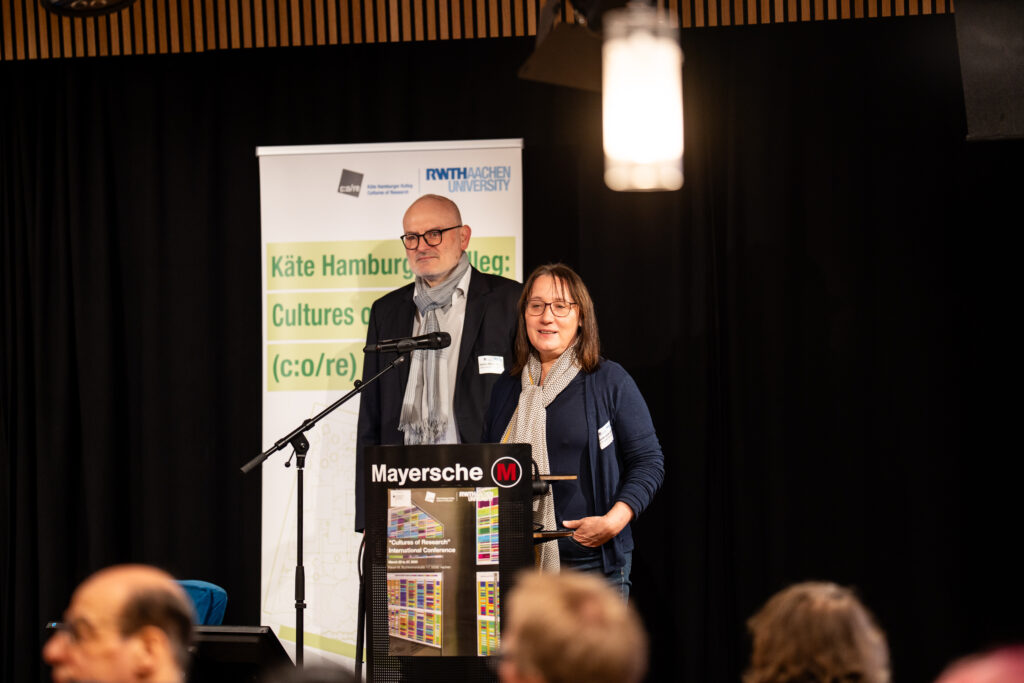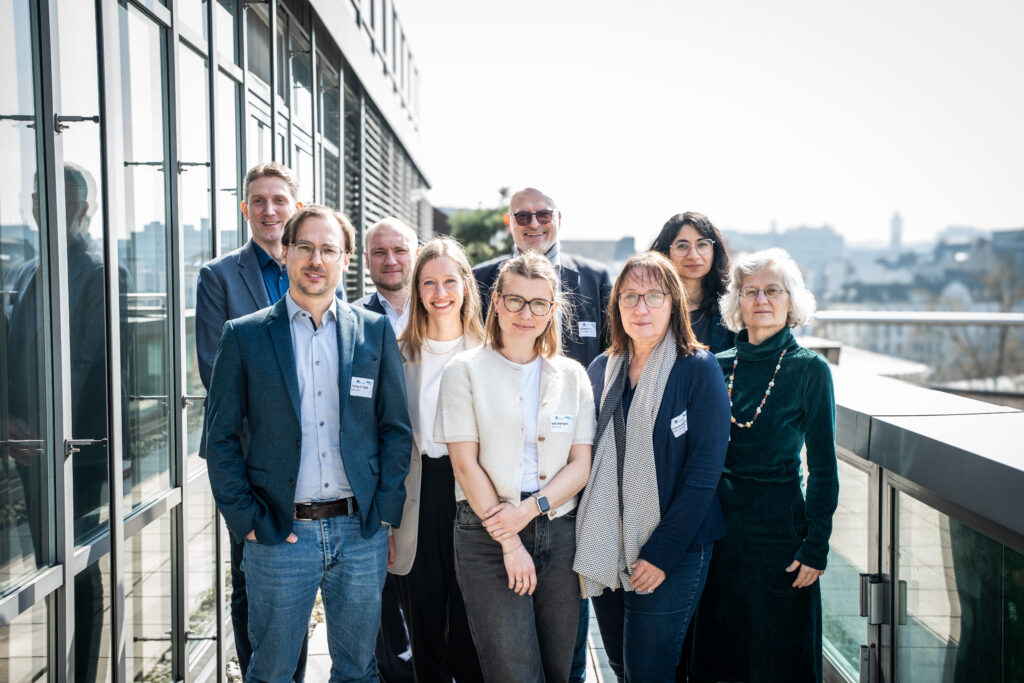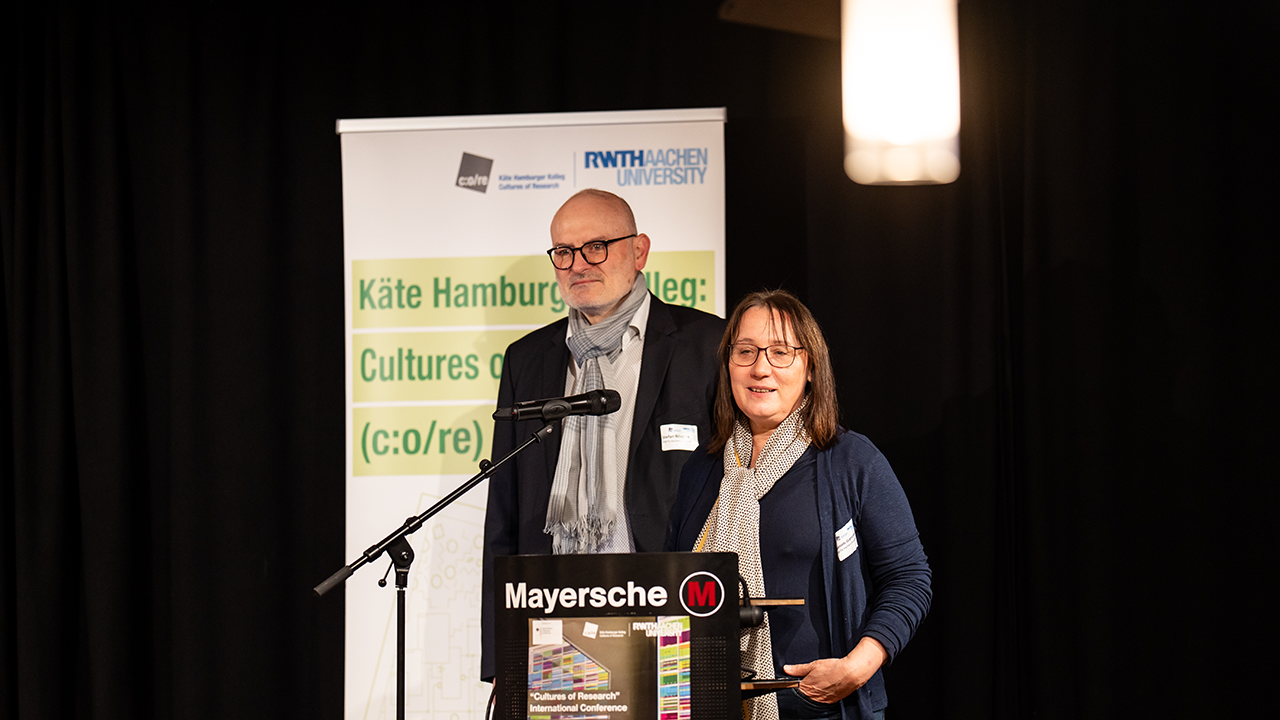The Käte Hamburger Kolleg: Cultures of Research (c:o/re) at RWTH Aachen University will begin its second funding phase in May 2025. The German Federal Ministry of Education and Research (BMBF) will fund the center for another four years. With the start of the second phase, KHK c:o/re directors Gabriele Gramelsberger and Stefan Böschen look back, reflect on the achievements and developments of the past four years, and set out the goals and expectations for the coming years.
Looking back over the past four years: What were the highlights of the first funding phase?
It is already a highlight that c:o/re is the first Käte Hamburger Kolleg at a technical university and will probably remain the only one. It is also the only center for advanced studies in history, philosophy, and sociology of science and technology worldwide. The first funding phase was a development phase. This development has been successfully completed. We got a wonderful location for this Kolleg on Theaterstraße and the best possible team. We have had great fellows in all four cohorts, with whom we have developed exciting intellectual perspectives in very different ways. In addition, we have been able to organize a large number of events, networks, and collaborations both within and outside RWTH. Therefore, there are plenty of highlights to report on from the first funding phase.

What are the lessons learned, especially with regard to the interdisciplinary exchange with the fellows?
Experience shows how demanding this collaboration ultimately is, but also how fruitful. You wouldn’t necessarily expect different branches of the humanities and social sciences to work together with natural sciences and technology, but they do. We also work intensively with our colleagues from the natural sciences and engineering. That’s why we’ve developed various formats like lab talks to make these collaborations easier. We’ve also developed projects with some fellows that are now being carried out in cooperation with the Human Technology Center (HumTec). The most important lesson learned, however, is certainly that this type of collaboration not only requires more time and a more relaxed attitude, but also that specific opportunities should be created so that the work can lead to joint results. Goal-orientation fuels interdisciplinary cooperation. In the “Software Group” (a working group at the KHK c:o/re – editor’s note), for example, an article was written with many fellows from a wide area of disciplines and published in Nature Computational Science.
What do you enjoy most about working at the KHK c:o/re?
It’s just wonderful that the KHK gives us a platform that allows us such unusual freedom in our research. This has to do with a number of important boundary conditions. On the one hand, generous funding from the German Federal Ministry of Education and Research (BMBF) allows us to invite a large number of fellows from all over the world every year to work with us on fundamental questions in science. Second, we have a great team that not only supports the work but also enables us to work together on our research goals. Finally, we receive exceptional support from the Rectorate of RWTH Aachen University, which regards the work of the Kolleg as an important asset for its strategy for excellence.
What are the goals of the second funding phase?
In the second funding phase, we are taking seriously the feedback from last year’s evaluation of our research group. The evaluation went very well fostering our research profile more strongly. This will enable us to produce results of even greater relevance and visibility. Against this background, we are pursuing two lines of research, one dealing with the digitization of research (“Varieties of the Digital”) and the other with the cosmopolitization of science (“Varieties of Science”). These lines of inquiry are not only significant in their own right, but also allow us to advance the program of an integrated interdisciplinary methodology of science studies itself, which we bundle under the heading “Expanded STS”. Furthermore, we will link “Expanded STS” to the historical reflection of computing, philosophy of science, and STS. We are working on two book series. One will consist of three volumes dealing with the history, philosophy, and sociology of computing and computational science. The other will consist of two volumes on Expanded STS.
What are you looking forward to?
We can look forward to four more exciting years. We will certainly cultivate even more freedom for individual and joint research than we have done so far. In addition, the Kolleg allows us to further develop and strengthen our international networks related to our research topics. In this way, we hope not only to achieve insightful research results, but also to support the development of a special epistemic culture at our University. This is based on the ideal of tailor-made, integrated, interdisciplinary research practices for understanding science itself, but also for finding more targeted solutions to collective problems.

What challenges do you see in the current research landscape and how does the KHK c:o/re address them?
There are a number of significant changes in the research landscape. These can be described using the triad of transformation, transformation of science, and transformative research. These changes challenge our self-image as researchers, but also the institutionalized self-understanding of science. Although science represents an institutionalized special space for the production of epistemically sound knowledge, it is also increasingly caught up in the maelstrom of contemporary transformations. Making these transformations analyzable in terms of their structure and dynamics is the central concern of our research at the Kolleg.
What is your current research focus and how does it relate to your work at the KHK?
Gabriele Gramelsberger: My research focuses on a long-term narrative of the digitization of science as part of the philosophy of computer science. The history of computer science and computational science on the one hand and current developments towards AI on the other are linked to better understand today’s “digitality”. In my view, digitality began long before the invention of the digital computer in the 1940s. Digitality is the result of the operationalization of the mind of modern philosophy in the 18th century. In the 19th century, mathematics took over, and in the 20th century, engineering took over. However, with this broader perspective, we can better integrate the humanities and social sciences into the current understanding of the digital, which is dominated by science and technology. Above all, we need to better understand the cultural impact of software, which has become the general infrastructure of research and everyday life. Its cultural impact is based on the fact that programming has introduced a new and very powerful way of using written language that not only describes operations but also executes them. Nevertheless, it is a product of written language that is worthy of being archived as cultural heritage and researched by historians, philosophers and sociologists of science and technology.
Stefan Böschen: My research focuses on a wide range of issues in the sociology of science and expanded STS (science and technology studies). Of particular importance are the different forms of collaborative research in a variety of settings. These typically relate to a wide range of fields of innovation and transformation (from neuromorphic computing to a DC-driven energy transition). In this context, concepts of research infrastructures (such as living labs) or those of the analysis of innovation and transformation processes (such as innovation ecosystems) can be further developed. This also creates highly productive new interfaces with research at the Kolleg. For example, the form and dynamics of living labs can be examined in their region-specific differences and thus investigated with regard to the differences brought about by varieties of science (cultural-institutional varieties of scientificity).
What is your “culture of research”? How would you describe the way you conduct research?
Gabriele Gramelsberger: My research culture combines epistemic and historical research in order to better understand current developments. The historical dimension encompasses a wide range of interdisciplinary practices and aspects that I am interested in. Therefore, the Kolleg is the perfect place for me to live my research culture.
Stefan Böschen: My research culture can be characterized by the combination of engineering (I am a trained chemical engineer) and sociology. This has not only given me a keen interest in technology assessment and science and technology studies, but also a great enjoyment of interdisciplinary collaboration at the interfaces between very different disciplines. The productive connection between the various disciplines of science studies plays a particularly inspiring role for me.
The interview was conducted by Jana Hambitzer.



One Comment
Comments are closed.